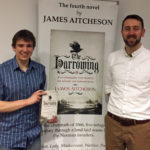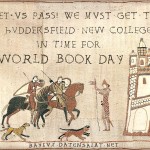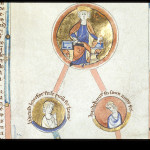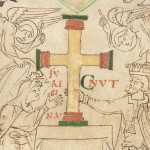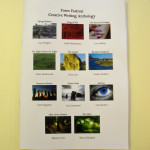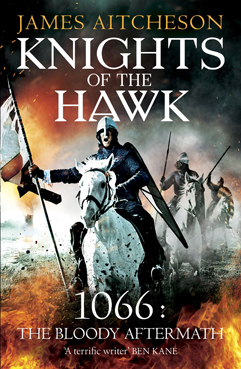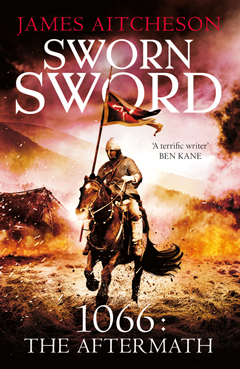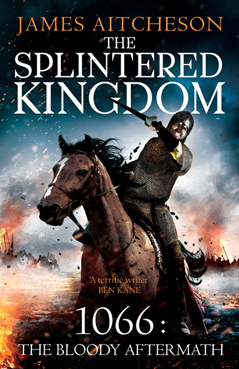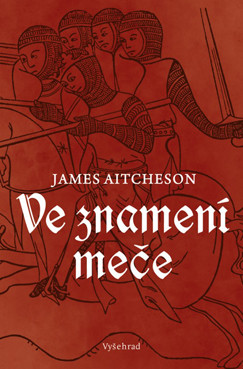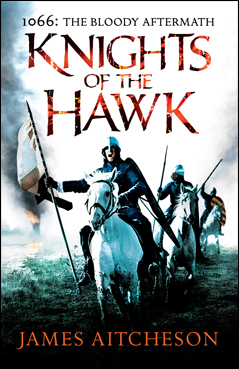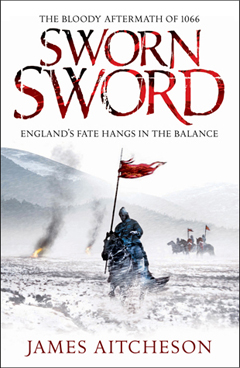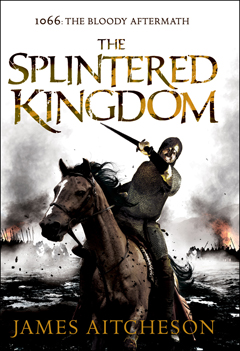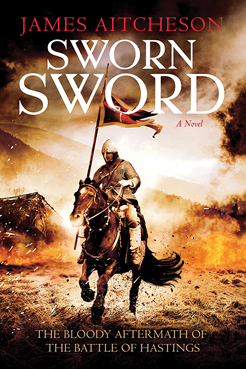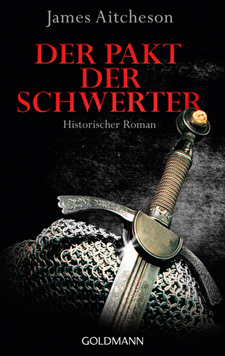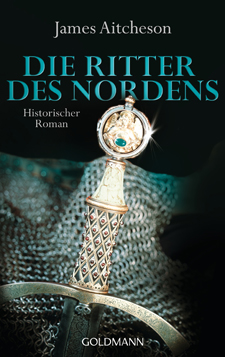As well as visiting bookshops and libraries as part of my book tour, occasionally I’m also invited to speak about my work in universities and schools, and it’s been my pleasure in the last few weeks to present talks and chair workshops at both Swansea University and Huddersfield New College.
At Swansea I was invited
As well as visiting bookshops and libraries as part of my book tour, occasionally I’m also invited to speak about my work in universities and schools, and it’s been my pleasure in the last few weeks to present talks and chair workshops at both Swansea University and Huddersfield New College.
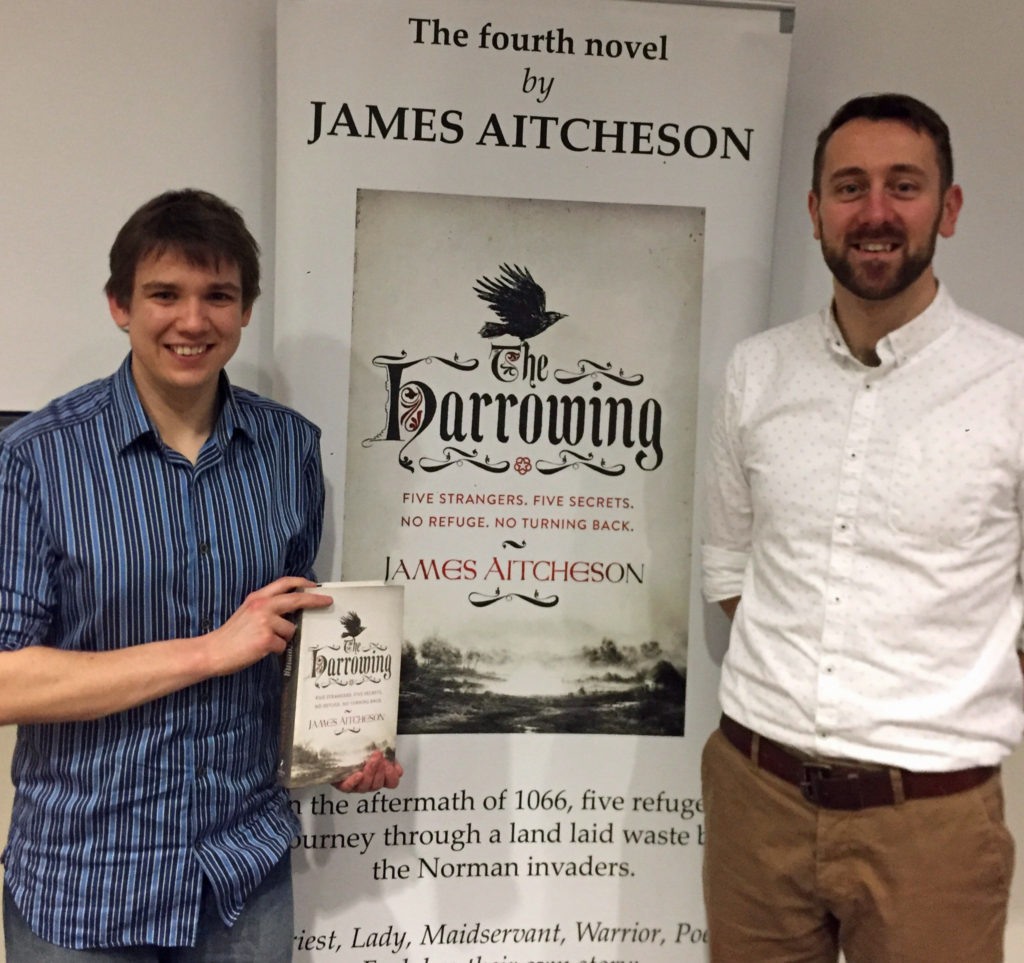
From left to right: myself and Dr Charlie Rozier following my public lecture at Swansea University. Photo credit: Swansea University.
At Swansea I was invited first to co-chair a workshop for medieval history students, looking at primary sources, their value and their limitations. After a short presentation by me, students used extracts relating to the Norman Conquest as inspiration for creative writing – an unusual and in many ways counterintuitive brief to give historians, for whom imaginative interpretation of available evidence doesn’t always come naturally, but an exercise that produced some interesting results.
Later I also gave a public lecture on the process of writing historical fiction, tackling a common question posed by readers, and one that has dominated the debate about the genre for seemingly forever: “Where do you draw the line between fact and fiction?” Drawing upon examples from my own work, I argued that we shouldn’t fixate, as we traditionally have done, on the issue of historical accuracy. Rather, we should celebrate fiction’s potential to understand, interpret and communicate the past in new ways, and I offered some alternative ways of framing the debate regarding the genre.
Both sessions provoked some lively discussion with staff and students, historians and writers alike. I was thrilled to be invited to speak – my thanks to Dr Charlie Rozier (pictured with me, above) for kindly organising the event and making sure the day ran smoothly.
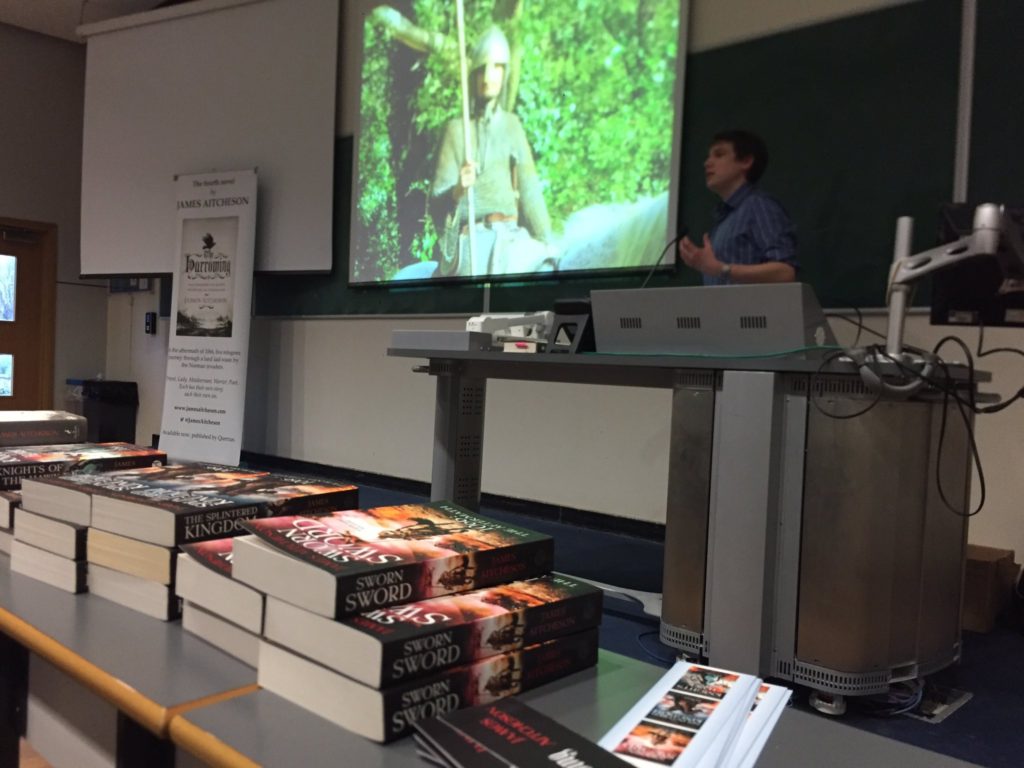
Delivering my public lecture on historical fact and fiction at Swansea University. Photo credit: Charlie Rozier.
The following week I was delighted to return to Huddersfield New College for the third year in a row as their guest author for World Book Day. As well as speaking about the process of researching and writing historical fiction with A-Level medieval and modern history students, I also led a creative workshop based around a series of timed writing challenges designed to free up the imagination and to help writers bypass the internal editor that can sometimes hold them back.
Students were encouraged to write as much or as little as they wanted, without any obligation to share what they’d produced. The challenges varied in difficulty and structuredness, including question-based prompts for generating plots, a picture-based free writing exercise and the ever-popular (and my favourite) “word salad”. I was hugely impressed not just with the energy and enthusiasm the students brought to all of the tasks, but also the range of different responses produced, which often put my own efforts in the shade!
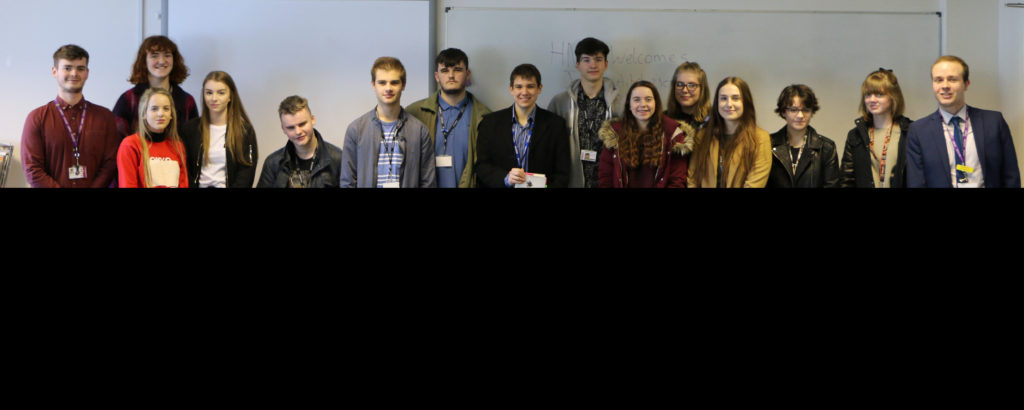
Me (centre, holding The Harrowing) with A-Level students at Huddersfield New College and History course leader Scott Townsend (far right). Photo credit: Huddersfield New College.
Again this year I was given the honour of presenting the certificates at a lunchtime prizegiving ceremony to the winners – chosen by College staff – of the annual short story competition, this year themed upon myths and legends. I also made myself available throughout the afternoon to chat with students about their current writing projects and give advice. It was fantastic to speak to so many keen young writers, and I wish them all the best for their future literary adventures. I’d like to thank Rebecca Hill, the College Librarian, for putting together this year’s event, as well as to Scott Townsend, Sarah Newton and the Principal, Angela Williams, for once more making me feel so welcome.
I’m always happy to visit schools, colleges and universities to speak about my work and to run creative writing sessions. If you’re a teacher, librarian or lecturer and would be interested in hosting a similar event, please do get in touch with me via the Contact page – I’d be glad to discuss some ideas.
Earlier this month I was thrilled to be invited back to Huddersfield New College in West Yorkshire for a second year in a row to give an event as part of their celebrations for World Book Day, which fell this year on Thursday 3 March.
As last year, I not only gave a talk
Earlier this month I was thrilled to be invited back to Huddersfield New College in West Yorkshire for a second year in a row to give an event as part of their celebrations for World Book Day, which fell this year on Thursday 3 March.
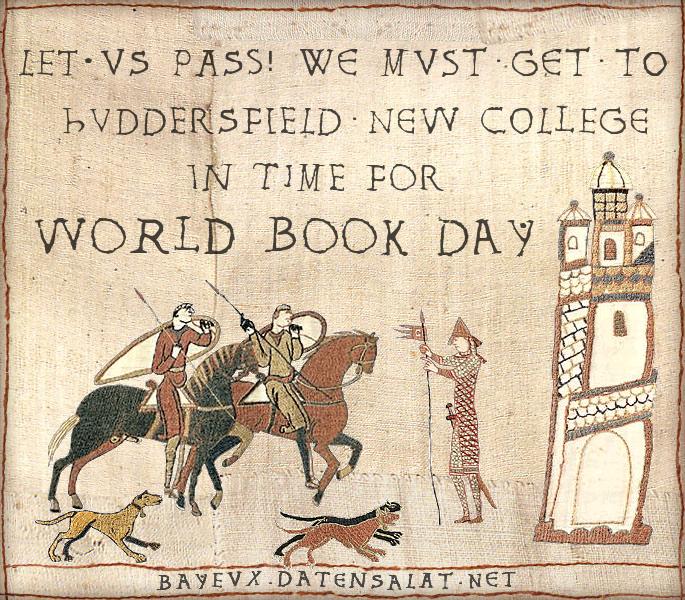
A previously undiscovered section of the Bayeux Tapestry.
As last year, I not only gave a talk to Year 12 and 13 History students about Anglo-Saxon England, but also ran a creative writing workshop for aspiring poets and prose writers, focussing on overcoming the fear of the blank page and on letting the imagination run wild.
The workshop involved a series of short exercises including a 3-minute free writing sprint, and various word- and picture-based challenges, after each of which we shared what we’d written with the rest of the group. It was a huge amount of fun not just for the students but also for me. As always in these sessions, I was massively impressed by the richness and diversity of the writing that emerged, and I hope that the students went away as energised and full of ideas as I did.
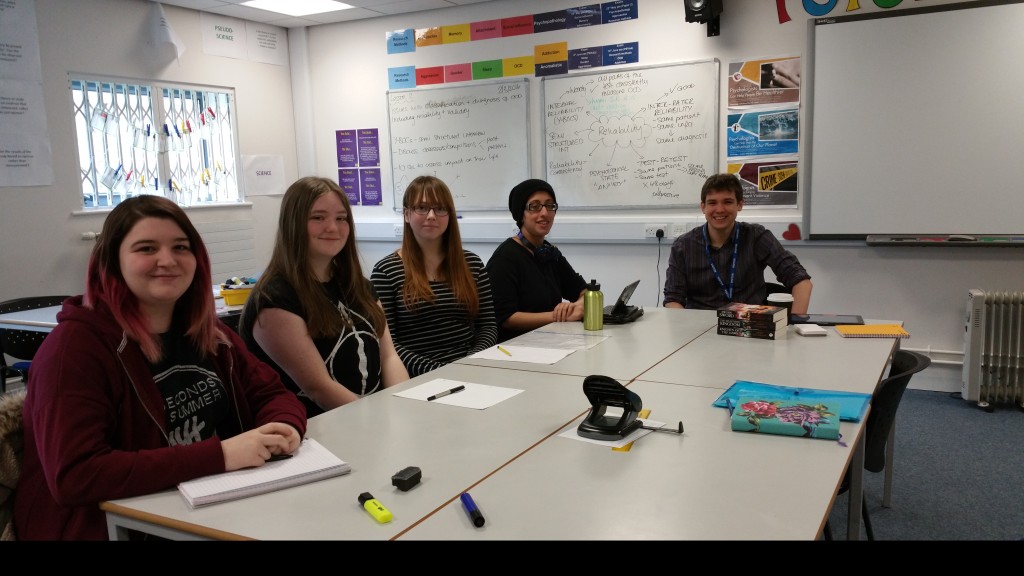
The writing workshop was a huge success, and tremendous fun too. Photo credit: Rebecca Wilson.
I was also given the honour of presenting the certificates at a lunchtime prizegiving ceremony to the winners – as chosen by staff – of the College’s annual short story competition. Needless to say it was a hectic day but also hugely enjoyable, and I’d like to thank the College librarian, Rebecca Wilson, for organising the event, as well as Mark Sheridan, Jean Westacott and the Principal, Angela Williams, for making me feel so welcome.
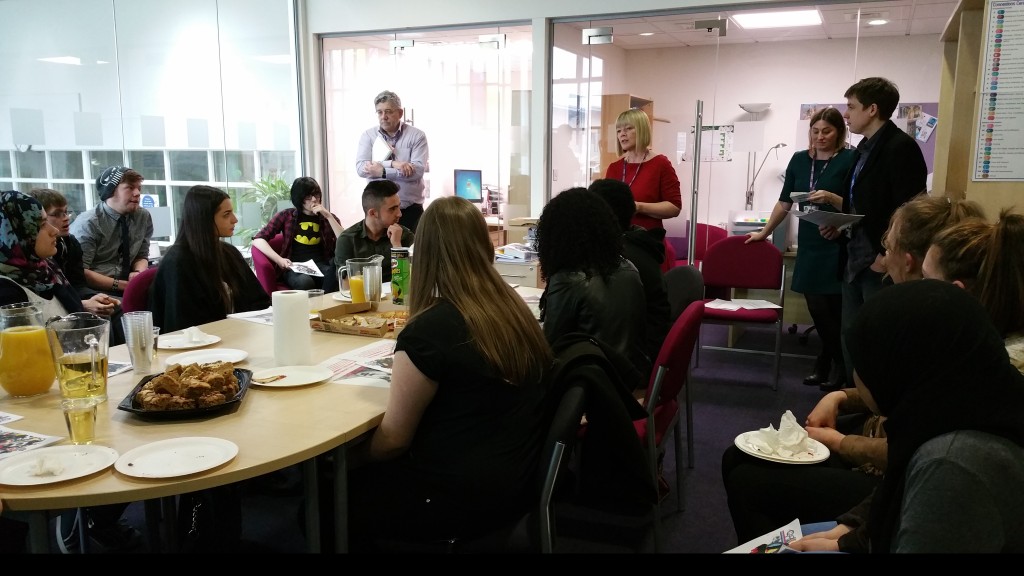
Presentation of the certificates for the winning entries in the student short story competition. Photo credit: Rebecca Wilson.
On Saturday 23 April, Viking scholars and other interested parties (myself among them!) will be gathering at the University of Nottingham for the twelfth annual Midlands Viking Symposium: a day of talks on all aspects of the Viking Age, given by experts in their field.
Like the London Anglo-Saxon Symposium, which I blogged
On Saturday 23 April, Viking scholars and other interested parties (myself among them!) will be gathering at the University of Nottingham for the twelfth annual Midlands Viking Symposium: a day of talks on all aspects of the Viking Age, given by experts in their field.
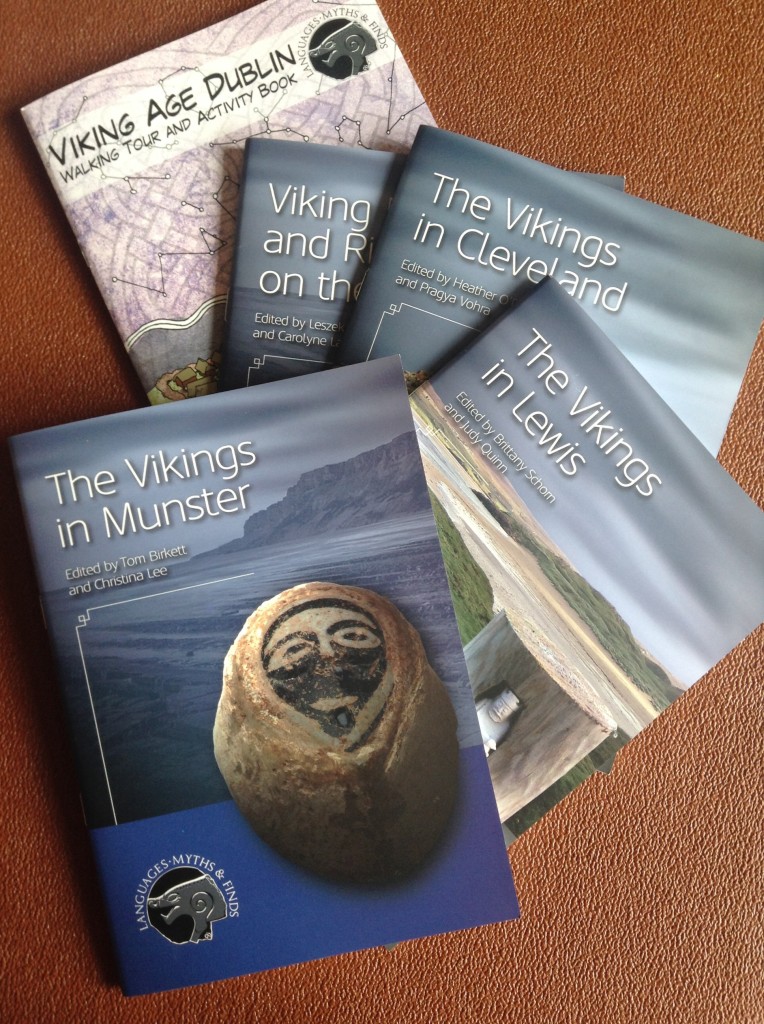
Booklets from the Languages, Myths and Finds conference – another Viking-themed University of Nottingham event – which took place in 2014.
Like the London Anglo-Saxon Symposium, which I blogged about earlier this year, MVS is all about bringing some of the latest historical research to a wider audience.
This year’s theme is Interpreting the Viking Age, and there are set to be talks on subjects including: the famous Oseberg ship; Norse place-names in Britain and abroad; and how British history from the Viking Age was recorded and remembered in the Icelandic sagas. There will also be a resident craftsman, Adam Parsons – archaeologist and living history enthusiast – talking about replica Viking artefacts, and how the originals would have been used.
The programme runs from 10am to 5pm and includes lunch and refreshments, and at only £30 is terrific value. This year will be the third year I’ve attended MVS – having previously been to the 2013 and 2014 events. Each time I’ve come away armed with new knowledge and new ways of thinking about the period (not to mention reams of notes, too!), much of which has found its way in one form or another into my new novel.
For more information about MVS 2016, including the provisional programme, or to register for the Symposium, visit the event page on the University of Nottingham website.
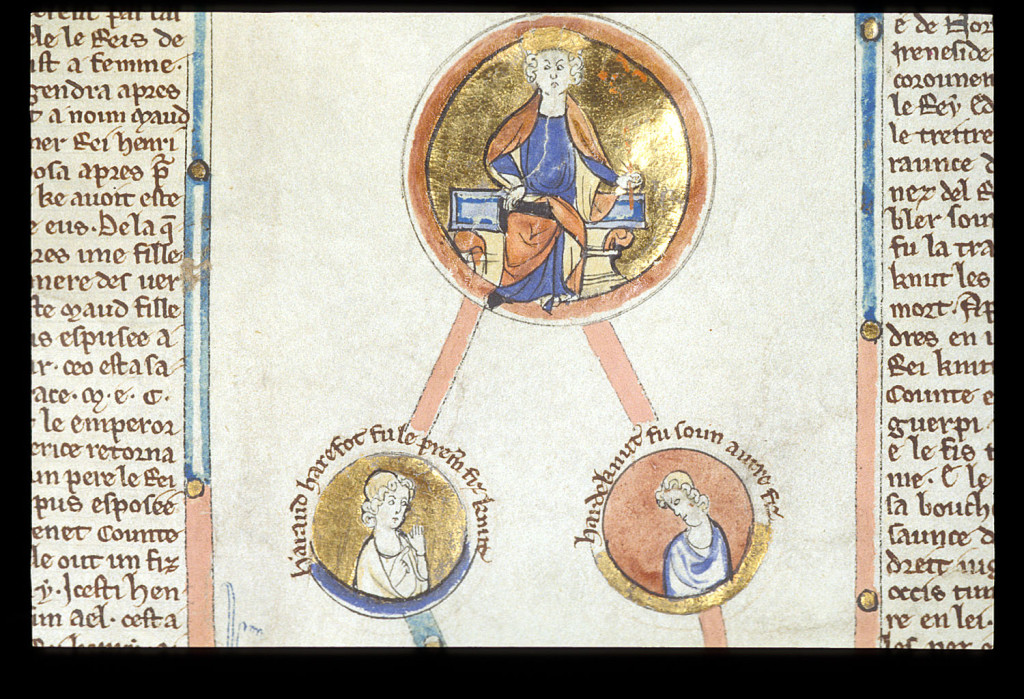
Cnut (1016-35) and his sons Harold Harefoot (1035-40) and Harthancut (1040-2), depicted in a genealogical roll from the late 13th century (Royal 14 B V Membrane 4).
MVS won’t be my only trip to Nottingham this year, either. I’m pleased to say that I’ve been invited by Dr Christina Lee (@NorseLass) to speak at a conference in late June and early July on The Viking World: Diversity and Change, as part of a round table discussion on academic research and historical fiction, which I’m looking forward to enormously. More news on that soon!
As I write this, I’ve just booked my place on the fifth annual London Anglo-Saxon Symposium, which will be taking place on Saturday 12 March, hosted by the Institute of English Studies at the University of London.
An afternoon of lectures representing some of the latest research into aspects of early medieval England, the Symposium
As I write this, I’ve just booked my place on the fifth annual London Anglo-Saxon Symposium, which will be taking place on Saturday 12 March, hosted by the Institute of English Studies at the University of London.
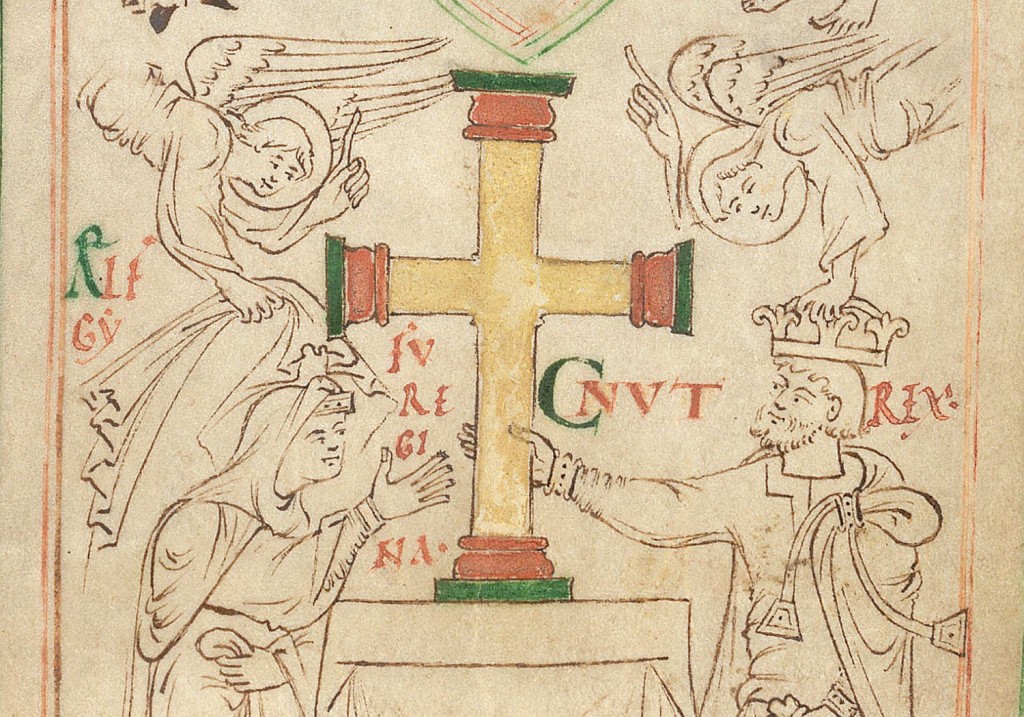
King Cnut (r. 1016-35), depicted with his wife, Queen Emma, in the New Minster Liber Vitae.
An afternoon of lectures representing some of the latest research into aspects of early medieval England, the Symposium is always a fun and informative event. I’ve been to it each of the last three years, and every time it’s opened my eyes to new ways of thinking and avenues of study that I hadn’t thought about before. The best part is that it’s only £12 to attend!
If Vikings are your thing, you’ll be pleased to hear that this year’s theme is Anglo-Scandinavian England. Among the topics under discussion will be: Viking ships; identities in Anglo-Scandinavian England; and the impact and influence of Old Norse upon the English language.
To see the full programme for this year’s Symposium – including abstracts for each of the papers – and to register, visit the LASS page at the Institute of English Studies.
Also, you might like to see my introduction to London c.1066, which was partly inspired by Dr Michael Bintley’s walking tour of the capital that formed part of the 2014 Symposium.
What makes a great first sentence? What do people look for in the opening of a novel? How do authors grab readers’ attentions and entice them to read on?
These were some of the questions I posed last week when I visited Marlborough College to lead a two-day creative writing workshop for a group of
What makes a great first sentence? What do people look for in the opening of a novel? How do authors grab readers’ attentions and entice them to read on?
These were some of the questions I posed last week when I visited Marlborough College to lead a two-day creative writing workshop for a group of Year 9s as part of their summer term’s Form Festival. The ancient monuments at nearby Avebury provided the inspiration, the students provided the creativity, and the end result was the very smart-looking anthology pictured here!
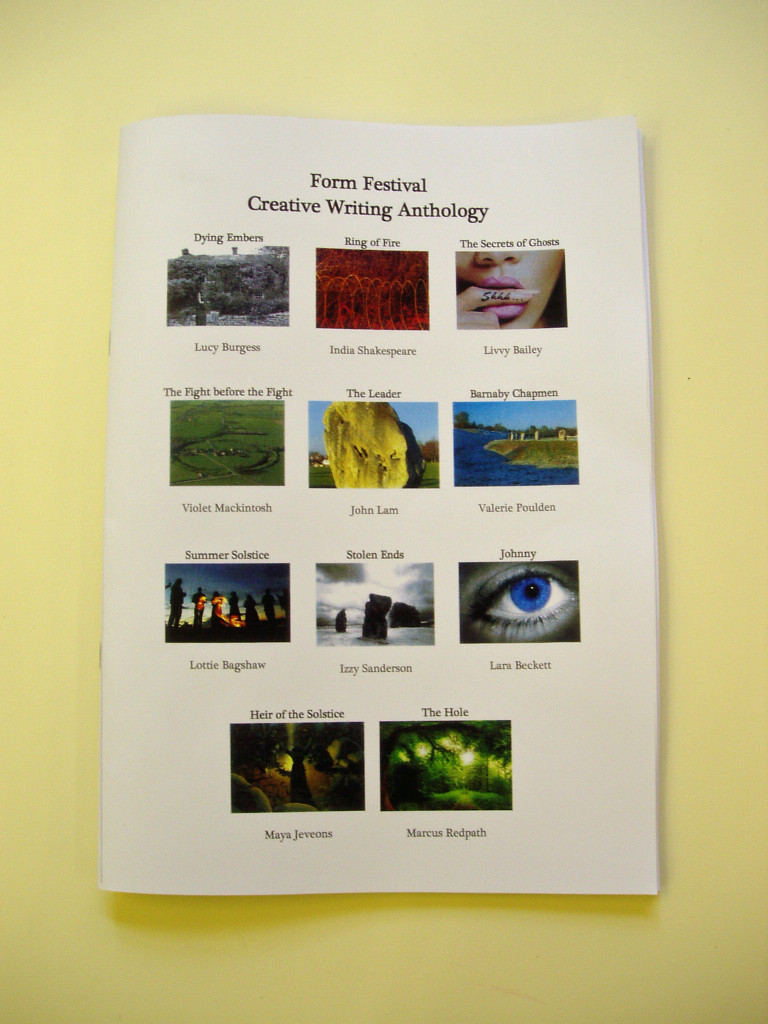
After spending a few hours exploring the ancient stones and the museums at Avebury, and trying to imagine the kinds of people who might have lived there through the ages, we returned to the College in the afternoon armed with character concepts and the seeds for possible plots.
With guidance, suggestions and feedback from me, the students then started to use the ideas they’d come up with to write a short story or the first chapter of a novel. At the end of the second day, all the pieces, complete with blurbs and front covers, were collected into the volume shown above, which was printed for the rest of the school to read and enjoy.
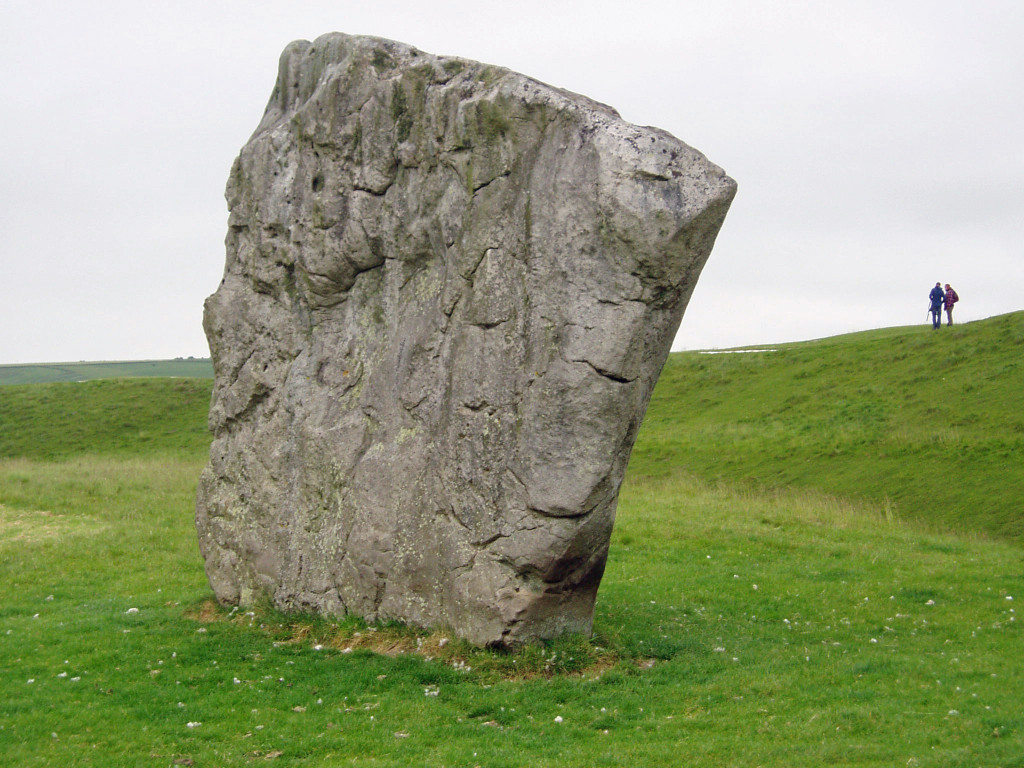
One of the two Portal Stones at Avebury, Wiltshire.
Although the main focus of the workshop was historical fiction, the students were encouraged to let their imaginations run wild and to write in whatever genre they liked, so long as their stories were connected in some way to Avebury.
What emerged from the workshop was an amazing outpouring of creativity. The tales produced took place in all periods of history, from the Neolithic to the Viking Age to the modern day; they featured supernatural forces, ancient rituals, long-forgotten battles, mysterious ruins, and a diverse range of characters including druids, archaeologists and a prehistoric proto-suffragette rebelling against the traditions of her tribe.
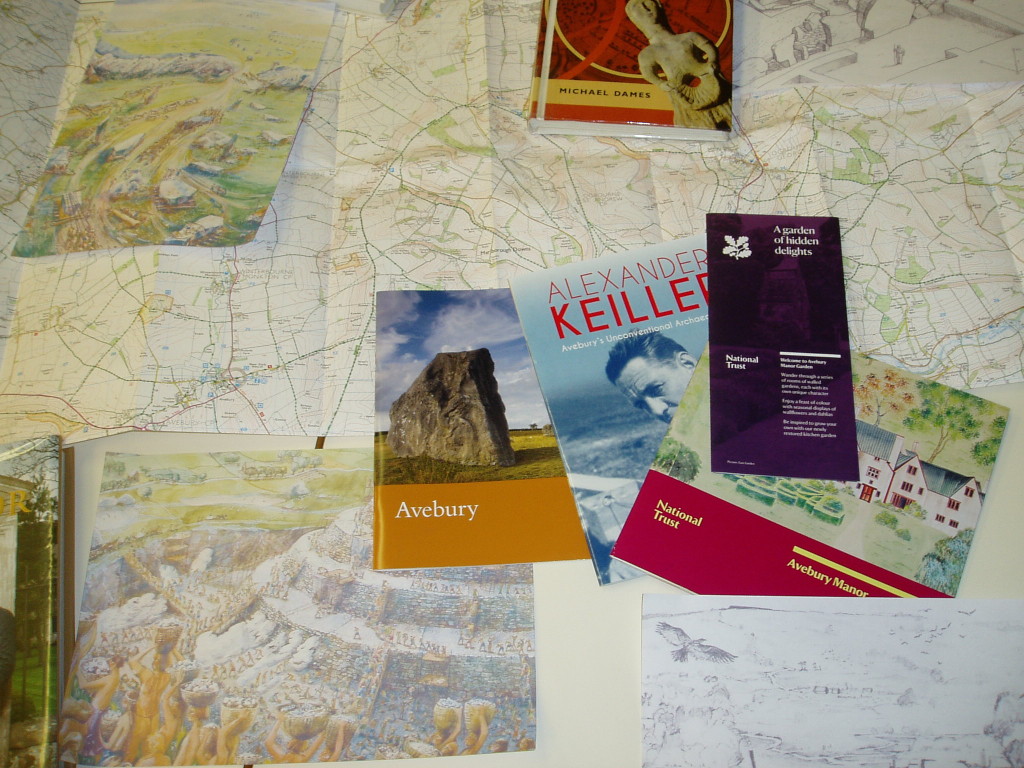
Some of the research materials used to generate ideas, including maps, artists’ renderings and (of course) books!
Thanks to everyone at Marlborough College for making me feel so welcome over the two days I was there. It was a pleasure to work with such an enthusiastic group of writers, and I wish them the best of luck for the future.
*
Earlier this year, I was invited to give a talk about the Norman Conquest and also to run a creative writing workshop at Huddersfield New College to celebrate this year’s World Book Day.
The creative writing session was based around a series of short, fun challenges designed to help free up the imagination, spark ideas and (above all) overcome the fear of the blank page – an affliction that strikes all authors from time to time.
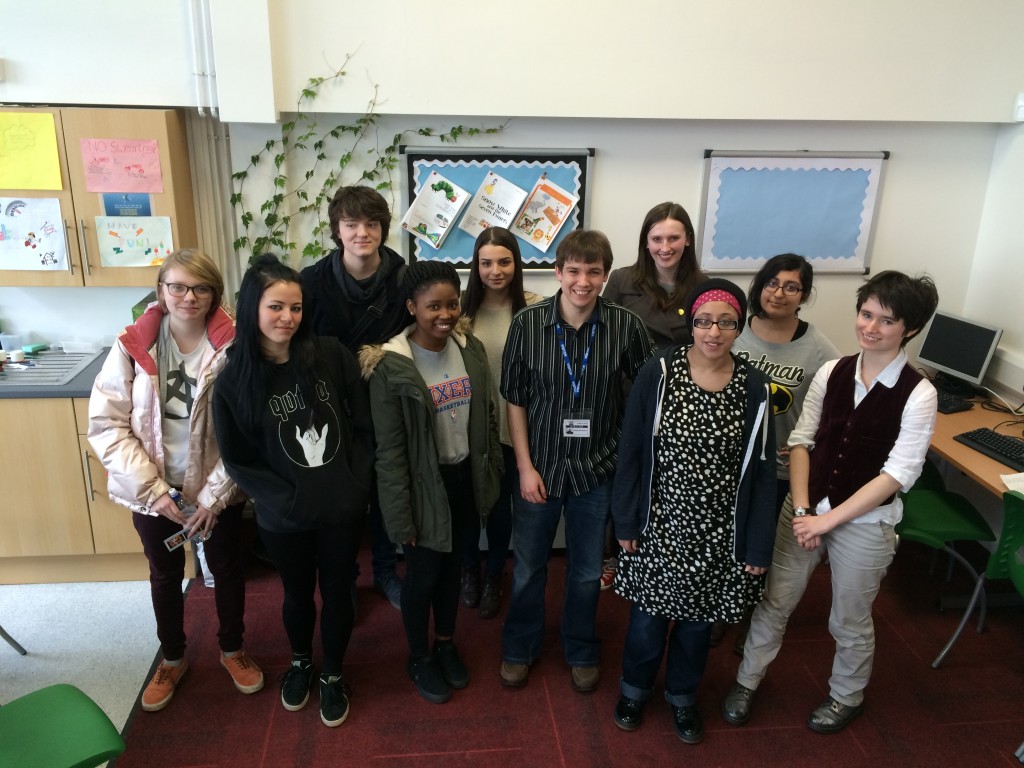
Here I am with the creative writing group at Huddersfield New College
on World Book Day 2015. Photo credit: Huddersfield New College.
I was blown away with the range and quality of writing produced in response to the various challenges I set. The workshop was enormous fun for me as well as for the students, as I think you can tell from our grins in the photo above, taken at the end of the workshop.
As at Marlborough, the welcome I received from both staff and students in Huddersfield was absolutely terrific. With any luck my being there will have inspired a few to go on to study History or to develop their writing further! I certainly felt very privileged to be in the presence of so many talented young authors, and I hope to be able to return in the not too distant future.
*
If you’d like to get in touch about organising a creative writing workshop at your school, college, library or festival, you can do so via the Contact page.
2014 is turning out to be the year of the Norsemen! As well as visiting the Vikings: Life and Legend exhibition at the British Museum and attending the Midlands Viking Symposium in the spring, last weekend I took time out from working on my latest novel-in-progress to go to the Unlocking the Vikings conference at
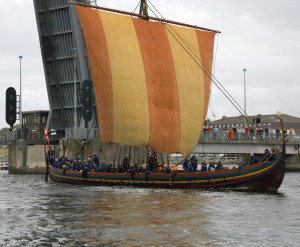
The reconstructed Viking ship, Sea Stallion, the subject of Tom Birkett’s paper at the Unlocking the Vikings conference, sails into Dublin, 14 August 2007.
(Image adapted under the Creative Commons Attribution-ShareAlike 2.0 Generic licence from an original photo by William Murphy.)
2014 is turning out to be the year of the Norsemen! As well as visiting the Vikings: Life and Legend exhibition at the British Museum and attending the Midlands Viking Symposium in the spring, last weekend I took time out from working on my latest novel-in-progress to go to the Unlocking the Vikings conference at the University of Nottingham.
In common with last year’s The Middle Ages in the Modern World at the University of St Andrews, the focus of the two-day event was as much upon the various ways in which the Viking Age has been represented in modern culture as it was upon the history itself. There were so many excellent papers and presentations – too many to mention individually – but I’ve chosen some of what, for me, were the highlights of the weekend.
The first session of the conference focussed on the Vikings in fiction, something of great interest to me since the Norsemen feature prominently both in Tancred’s saga and in the wider story of the Norman Conquest. Historian and novelist VM Whitworth (University of the Highlands and Islands) spoke about developing Viking Age characters, and the need for authors to fully immerse themselves in the thought-world of their creations. Ruarigh Dale (University of Nottingham) discussed portrayals of berserkers in current fiction, and how modern concepts compare with the original descriptions of these warriors in the Norse sagas.
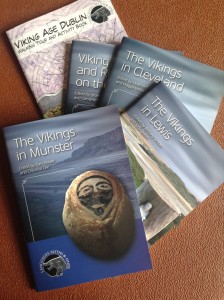
The findings of the Languages, Myths and Finds project were brought together in these five beautifully produced booklets.
The conference also marked the conclusion of the Languages, Myths and Finds project, which aimed to investigate how Norse heritage and culture continue to make an impact in the twenty-first century, and the ways in which the Viking past is remembered and celebrated in Dublin, Munster, the Isle of Man, the Hebrides and Cleveland. Each of the regional teams presented their findings, which included the dramatic reveal by the Cleveland researchers of a previously unknown Viking runestone – an especially exciting discovery since, in contrast to Scandinavia, so few have been found in England.
As well as giving presentations at the conference, the teams also produced a series of booklets containing the findings of their research (pictured, above left): one for each of the five regions explored in the study. The booklets can also be downloaded in PDF form from the Languages, Myths and Finds website, where you can also find out more about the project and its aims. The video below from the University of Nottingham also gives a brief introduction.
Other highlights from the conference included a skaldic performance by Thor Ewing, featuring music on reconstructed Viking Age harp and flute, and a paper by Tom Birkett (University College Cork) on his experiences aboard the Sea Stallion – a reconstructed Viking ship based on the remains of Skuldelev 2, an eleventh-century vessel excavated at Roskilde, Denmark in 1962.
As always with these events, I came away brimming with ideas and armed with several pages of notes, furiously scribbled during the various talks and presentations. And who knows? Somewhere in all those notes might lie the inspiration for a future novel or two…

